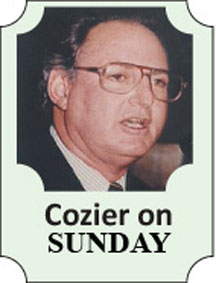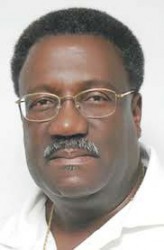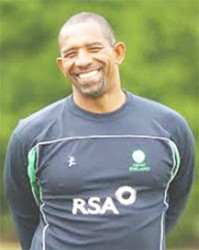It was a bomb waiting to detonate, wreaking more damage to West Indies cricket that, after two decades of collapse, can hardly withstand any more.
After lying dormant for almost a year, its fuse was relit on Friday by head coach Phil Simmons’ furious criticism on the continued exclusion of Dwayne Bravo and Keiron Pollard from the squad for three upcoming ODIs in Sri Lanka.
Ironically, Simmons was in an opposing camp when the explosive device was created in the aftermath of the team’s premature pull-out of its scheduled tour of India last October. Bravo and Pollard were dropped, without an official explanation, for the subsequent ODIs in South Africa and the World Cup.
It was assumed that Bravo was penalised as he was ODI captain in India; Pollard, in the rank and file, had his name seemingly drawn from a hat. In contrast, seven others from the Indian fiasco were retained for the World Cup. It typified the haphazard way West Indies cricket is run.
Their continued exile implies that they will be considered in future solely for T20s, for which they were chosen on the South African tour. Simmons’ beef, vented in a media session, was that, as head coach, he was denied the best team. He went further, alleging “outside interference” in the selection process.
 “People shouldn’t be using their positions to get players into a squad or, in this, to get left out of a squad,” he said. “It is wrong.”
“People shouldn’t be using their positions to get players into a squad or, in this, to get left out of a squad,” he said. “It is wrong.”
When the team exited India, WICB president Dave Cameron used social media to assert: “This feels like terrorism. You destroy a region’s heritage over an internal dispute. Unbelievable.” They were not the words that suggested conciliation.
Whether by conviction or coercion, chief selector Clive Lloyd and his panel omitted Bravo and Pollard in the first instance. Now Lloyd was on the same page as Simmons, a position he had earlier confirmed to me over lunch.
According to the head coach, Lloyd met the selectors and gave “exceptional reasons” why he believed it was time for them to return. He cited the similar support for Lloyd’s position of captain Jason Holder; while not on the panel, he has repeatedly referred to the strength Bravo and Pollard would bring to the team.
It cut no ice. Courtney Walsh, Courtney Browne and Eldine Baptiste stuck to their decision; the split was 3-2 in their favour.
Simmons was clearly unfazed by the possible repercussions of his outburst from a president and a board hypersensitive even to the mildest criticism. Lloyd might also be considering his options at present.
In a strongly worded letter following his description of the original axing of Bravo and Pollard as “victimization” and “ridiculous”, Chris Gayle was informed he would face disciplinary charges; Simmons and Lloyd can expect the same, even if, like Gayle’s, . the WICB eventually dropped the case.
The fallout from India simply won’t go away.


The crisis was triggered by a conflict between the WICB and the players over terms of a new contract. Already signed on the team’s behalf by the West Indies Players Association (WIPA), it was not presented to them until their arrival in Delhi. Bravo and his team, with the exception of Marlon Samuels, were adamant that they did not correspond with what they signed.
Bravo pressed Cameron to come to India to sort the matter out or the players would end the tour. Cameron didn’t go. The team duly pulled out after the fourth of five ODIs, leaving one ODI, a T20 and three Tests unplayed, prompting a claim for compensation of US$41.9 million from the Board of Control for Cricket in India (BCCI) and an assertion it would break relations to the WICB until it was settled.
It remains hanging ominously over an organization that acknowledged its virtual bankruptcy in a letter of apology.
An independent task force, commissioned by the WICB to investigate the reasons for the cancellation, held all three parties involved – the board, the players association and the players – equally culpable. As the WICB left the report in abeyance, .prime ministers Ralph Gonsalves of St. Vincent and the Grenadines and Keith Mitchell of Grenada intervened to broker an agreement at a meeting at a Port-of-Spain hotel. It stated that the contracts would be renegotiated “at a later date” with no action taken against the players in India.
When Bravo and Pollard were dropped, Gonsalves wrote to Cameron, charging the WICB with reneging on its commitment and calling the omissions “a travesty of justice…that reeks of village vengeance, discrimination and victimization”. It made Gayle’s simultaneous censure seem flimsy.
WICB’s chief executive Michael Muirhead kept the issue alive with several unsubstantiated claims that negotiations were ongoing with the BCCI to end the impasse. The BCCI said nothing in response.
In the circumstances, the input of senior players in a young, inexperienced team under Jason Holder, a young captain, and his even younger deputy, Kraigg Brathwaite, becomes become even more critical for the two Tests and three ODIs on the upcoming tour of Sri Lanka.
It is a challenge especially for Marlon Samuels, whose heartening introduction into Test cricket in Australia in 2000, aged 19, has been followed by a chequered history.
From the start, numerous flattering portrayals have been affixed to his batting. Too often, his unpredictability has prompted far less favourable assessments while vigorously denied match-fixing charges and problems with the legality of his off-spin action cost him three years out of international cricket.
The time is now for Samuels to add “consistent” and “responsible” to his resume.
At 34, with a record of 59 Tests, 174 ODIs and a combined total of 15 hundreds, he fills a key position in a middle order. For the first time for two decades it is without the steadying influence of Shivnarine Chanderpaul and manned, instead, by Jermaine Blackwood, Shane Dowrich and Shai Hope, three promising fledglings in their early 20s with 13 Tests between them.
Along with his batting, Samuels’ experience is necessary in a squad of 15 with 11 under-30. Only wicket-keeper Denesh Ramdin, 30, replaced by Holder prior to the series after 13 Tests, has more Tests (69 to 59).
In his 30 Tests since he returned from his suspensions, Samuels has added five hundreds to his earlier two and averaged 42.98; there have been six additional ODI hundreds. His T20 gem was the 56-balls 78 against Sri Lanka in the 2012 World T20 final when he kept launching Lalith Malinga into the shocked home crowd, setting up the unlikely West Indies victory.
Annoyingly, potentially big scores have been repeatedly cut short by reckless strokes and single digit failures. What Holder and Simmons, providing he is still there, now require from Samuels is the classy consistency that mastered England’s vaunted bowling in three away Tests in 2012 for an average 96.5.
To fall short would jeopardise West Indies’ chances and his own future.







